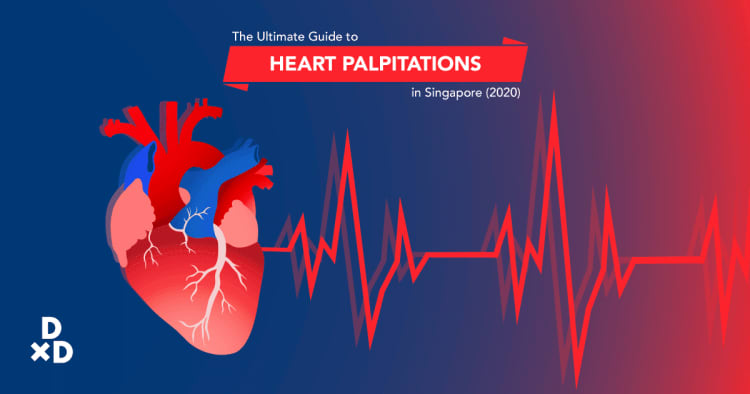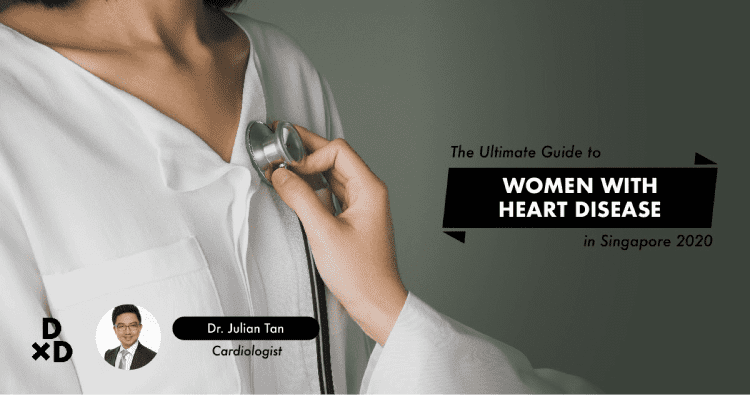What are Heart Palpitations?
Heart palpitations, as the name suggests, is the feeling of having your heart rate increase, a fluttering or pounding heart. Although it can make you feel worried if you're experiencing these palpitations, this condition is usually harmless [1].
From my years of experience as a cardiologist, I would like to share this guide so you know what to expect, what causes palpitations, and when a visit to the doctor is needed (or not).
Common triggers include:
- Stress
- Exercise
- Medication
- Medical conditions (rare)
In rare cases where the trigger of heart palpitations is due to an underlying medical condition like arrhythmia (irregular beating of the heart), special treatment may be required.
What do Heart Palpitations feel like?
Heart palpitations can feel different for each individual. Sometimes, it can be described as if your heart has “skipped a beat”.
Heart palpitations can feel like your heart is [2]:
- Fluttering
- Throbbing
- Flip-flopping
- Murmuring
- Pounding
Patients have described these symptoms to me as a pounding in the chest or even up to the neck, others can experience them as having a general sense of uneasiness or anxiety.
These symptoms can also be present regardless if you are actively moving or at rest.
What causes Heart Palpitations?
It is hard to pinpoint the exact cause of your heart palpitations as they come and go rather abruptly. They can be caused by certain activities, emotions or even food.
1. Common causes
Some common causes of heart palpitations include [1]:
- Strenuous exercises
- Medications containing pseudoephedrine
- Fever
- Hormonal fluctuations due to menstruation, pregnancy or menopause
- Excess or insufficient thyroid hormones
2. Emotional causes
Sometimes, the emotions that you experience can trigger heart palpitations. Your emotions can activate your body’s autonomic nervous system (ANS), better known as your “fight or flight” response [3].
Your ANS will then regulate the functions of your heart which leads to heart palpitations.
Emotional causes of heart palpitations include [4]:
- Stress
- Anxiety
- Depression
- Panic attacks
- Fear
- Shock

3. Diet
Some foods can act as a stimulant towards your body and trigger heart palpitations. Spicy foods which lead to heartburns are also an indirect trigger of heart palpitations.
Dietary causes of heart palpitations include [5]:
- Low levels of potassium
- Low blood sugar levels
- Dehydration
- Food allergy or sensitivity
- High sodium foods
- Excessive use of alcohol or caffeine
- Theobromine in chocolate
4. Medical Condition
As mentioned before, medical conditions like arrhythmia and hyperthyroidism can be the underlying cause of heart palpitations.
Causes include [1]:
- Hyperthyroidism. Also known as an overactive thyroid gland, hyperthyroidism leads to an excess of thyroid hormones in your body. Thyroid hormones have a physiological effect on the heart, causing it to palpitate [6].
- Arrhythmia. Arrhythmia is a condition where your heart rhythm changes to be abnormally fast, unusually slow, in an erratic sequence, or a combination of all 3.
Are Heart Palpitations triggered by the consumption of MSG?
Monosodium Glutamate, better known as MSG, is a flavour enhancer commonly used in canned and processed foods.
There hasn’t been any research to confirm that MSG causes heart palpitations, but if you are experiencing it when you take MSG, you could be sensitive or allergic to MSG [5].
MSG is considered by the Food and Drug Administration (FDA) to be safe for consumption. If you are sensitive to MSG, please read your food labels carefully and avoid foods with MSG in the ingredients.

What can increase my risk of Heart Palpitations?
Some factors which may increase your risk of heart palpitations include [1]:
- Being highly stressed
- Having an anxiety disorder
- Having regular panic attacks
- Being pregnant
- History of heart attacks or heart surgeries
- Heart conditions or defects
If you are at risk of heart palpitations, my advice would be: try to be more cautious in avoiding triggers or look for effective treatments for yourself. Although heart palpitations are usually harmless, if they are caused by heart conditions, there is a risk of complications.
What are the complications of Heart Palpitations?
In my experience, complications of heart palpitations are rare unless you already have an existing heart condition. Possible complications include [7]:
- Fainting. When your heart beats rapidly, your blood pressure can drop to very low levels, causing you to faint.
- Stroke. If the cause of your heart palpitations is due to atrial fibrillation, where the upper chambers of your heart are unable to beat properly, this condition can cause blood to form a pool and clot. When the blood clot breaks loose, there is a chance it might block a brain artery, causing a stroke.
- Cardiac arrest
- Heart failure
- Death
Should I be worried about my Heart Palpitations?
Heart palpitations are actually rather common in the general population of Singapore. It's more common than you think! There has also been an increase in the number of people suffering from heart palpitations in Singapore.
So, you shouldn't have to worry if you’re experiencing heart palpitations. Just remember that if it occurs infrequently and only for a short few seconds, there is no need to panic because it is highly probable that it is nothing serious.
If you are having food that you’re sensitive to or are engaging in certain activities like exercising when you experience these palpitations, I would say simply take a break from those foods or activities until your palpitations have subsided.
When should I visit a doctor?
As I've mentioned earlier, heart palpitations are nothing to be afraid of or worry about. However, if you are experiencing any of the following symptoms [1]:
- More frequent heart palpitations
- Worsening palpitations
- Chest discomfort or pain
- Severe shortness of breath
- Severe dizziness
- Fainting
Please seek medical attention immediately. I wouldn't wait too long if I were you. These are signs in which your heart palpitations are becoming dangerous signals of a more serious heart problem.
Read also: 5 Reasons Why You Should Get Your Heart Palpitations Checked
How are Heart Palpitations diagnosed in Singapore?
Diagnosis of heart palpitations can sound scary, but here’s one of my patient’s journey to treating heart palpitations.
A patient came to me complaining about heart palpitations when he was exercising. After better understanding his symptoms and the situation, we decided to put him through the Bruce protocol stress test, also known as the treadmill exercise test.
During the treadmill test, we will need the patient to achieve the maximum permissible heart rate. The patient’s heart rate while exercising was measured along with the duration of exercise.
Personally, I would stress my patients out until they’re fatigued or breathless from the treadmill test to get a better understanding of their condition.
For this patient, we actually measured that he has an arrhythmia around the 9 minutes 30 seconds mark. My minimum standard is 9 minutes. With this result, the patient was admitted and more thorough checks were conducted.
Also Read: How do I know if heart palpitations are caused by an irregular heart rhythm?
How much does a diagnosis for Heart Palpitations cost in Singapore?
The cost of consultations and basic diagnosis can be summarised in the table below.
Procedure
Estimated Costs
Consultation (First visit)
$150
Consultation (Follow up)
$100
Outpatient Treadmill Exercise Test
$250
Holter Monitor
$300
There’s an option for an essential health package ($380) which includes:
- Full blood count
- Fasting lipid profile
- Diabetic screening
- 2 Consultations
- ECG (Electrocardiogram)
- Treadmill exercise test
- Basic blood test
- Height & weight measurement
However, this package is not available for every patient. Do check with your healthcare provider or your doctor if you are eligible for this health package.
Read on to find out more about Health Screening in Singapore.
What Treatments are available for Heart Palpitations in Singapore?
There is no exact treatment for heart palpitations itself. Since heart palpitations are usually signs or symptoms of another underlying condition, the treatment for heart palpitations would be to treat the condition that’s causing the heart palpitations.
On top of that, if you think your heart palpitations are due to medication that you’re taking, sound out to your doctor and ask for alternative medications.
However, if your heart palpitations are due to your lifestyle choices like smoking or excessive caffeine intake, cutting down or eliminating those activities would be the best way to get rid of heart palpitations [5].

What home remedies should I use to relieve my Heart Palpitations?
While there are no specific treatments for heart palpitations only, you can try some home remedies to alleviate this condition [8].
- Relaxation techniques. Strong emotions, like anger, or stress can lead to heart palpitations as adrenaline levels spike. Managing these emotions or stress can help you to manage your heart palpitations [9].
Meditation, tai chi and yoga are some activities you can consider taking up to better relax your body and emotions. Taking 3-5 deep breaths every few hours throughout the day can calm your mind and reduce the occurrence of heart palpitations.
- Reduce/Eliminate stimulants. As the saying goes, there’s no smoke without fire. By eliminating the stimulants of your heart palpitation, the recurrence of your condition would decrease. Stimulants include substances like caffeine, alcohol, drugs, tobacco and high blood pressure pills.
While these are some common stimulants observed, your stimulants are unique to you. You can try keeping a list of the things that you eat or activities that you have done and try to avoid them if you think that they are causing you heart palpitations.
- Do Vagal Maneuvers. Vagal manoeuvres are the stimulation of your vagus nerve. The vagus nerve connects your brain to your heart, and stimulating it can help regulate your heartbeat [10]. But before trying this, please consult your doctor on the technique that would be the most effective for you.
Some ways you may try to stimulate your vagus nerve are:
- Taking a cold shower or splashing cold water onto your face. The shock of the cold water is the key to stimulate the nerve.
- Coughing or gagging
- Holding your breath or pushing down like you’re making a bowel movement.
4. Keep hydrated. When you are dehydrated, your blood becomes thicker. This means that your heart has to pump harder in order to transport blood to the rest of your body. As such, your heart rate would increase and potentially lead to heart palpitations.
If your heart rate starts to increase, it would be good for you to reach for a glass of water before your heart starts to palpitate. Otherwise, if your urine is a dark yellow, it would be good to start hydrating yourself to prevent heart palpitations.
- Balance your electrolytes
Electrolytes in your body play a significant role in regulating your heart rate.
You can boost the amount of electrolytes in your body by eating foods which are rich in potassium, magnesium, calcium and sodium. While most diets would provide sufficient amounts of sodium, the other nutrients can be obtained via other kinds of food.
High in Potassium
High in Magnesium
High in Calcium
Potato
Banana
Avocado
Spinach
Nuts
Fish
Dark, leafy greens
Milk
Dairy products
Dark, leafy greens
While it may seem more convenient to just take supplements to boost the nutrients in your body, it is always better to consult your doctor before taking them.
After all, a surplus of electrolytes can also cause problems. If you suspect that you have an imbalance of electrolytes, you can ask your doctor to test your urine and blood.
Are Heart Palpitations a sign that you have COVID-19?
While COVID-19 is a condition that mainly affects the lungs, there have been patients who experience cardiac issues. One of the key links to that is due to the amount of inflammation that the infection has caused in the body [11].
A large inflammatory response to the infection can make the heart work harder to pump blood to the site of infection, leading to heart palpitations.
However, heart palpitations are not a direct symptom of COVID-19. Do not be anxious and self-diagnose yourself if you are having heart palpitations. It is always best to visit your doctor if you are unsure of the symptoms that you are experiencing.
Conclusion
Heart palpitations are not something you should worry about if you don’t suffer from other heart conditions.
I hope reading this has managed to relieve you of your anxiety over heart palpitations. If it still worries you, you can test out the various home remedies listed above. If your palpitations persist, do not hesitate to reach out to your doctor!











